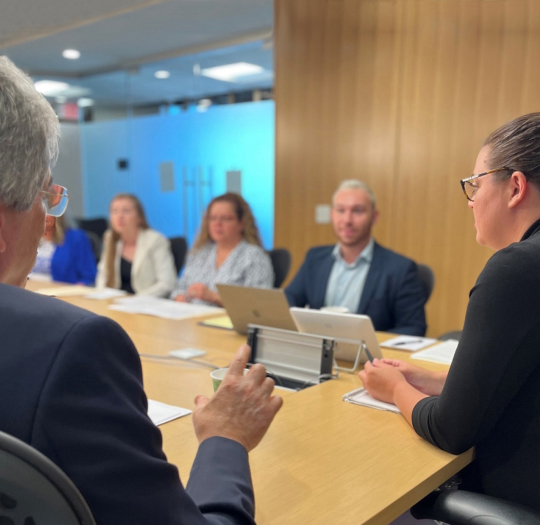Share Via
Download PDFStudy abroad programs help students to envision the world differently. They offer opportunities to expand networks and participate in academic activities that students might not experience otherwise.
Connecting students to these opportunities requires extensive communication and logistics, ideally supported by a reliable and high-performing wired and wireless network. At IES Abroad, students and staff struggled with inconsistent connectivity and network disruptions that made everyday tasks more difficult.
An inconsistent campus experience
IES Abroad is a study abroad organization offering 140+ programs globally. We have locations on six continents and in 34 countries, with more than 10,000 students studying abroad each year.
As Chief Technology Officer, my job involves delivering a seamless and robust network for staff and students. This isn’t easy when managing international locations. When I first joined, we were using a locally managed service provider, and many of our overseas locations relied on different network vendors for both hardware and software. Sourcing the same equipment across different locations proved difficult, leading to inconsistent network and management interfaces. Some of our larger centers struggled with outdated equipment and network traffic congestion.
Because of these challenges, we started receiving negative feedback on our network surveys, which concerned us. Today’s students expect flawless connectivity wherever they go, including on campus. Many were disappointed when they couldn’t reliably access academic resources, attend virtual classes, video call friends and family, or play online games because the network couldn’t support these activities.
I wanted to deliver an enterprise-class network experience that made students feel at home, even while studying abroad. Achieving that meant finding an alternative to our existing managed service provider.
Getting in at ground level
Faced with the need for a stronger, more reliable network across our global locations, I started exploring distributed networking systems that could support IES’s operations. That’s when I discovered Nile, connected with one of their sales reps, and decided to run a proof of concept to evaluate their platform’s performance and reliability.
At the time, Nile was still in “stealth mode.” They couldn’t yet produce long-term success stories, but I talked to several Nile customers to learn how the solution fared in the field. They had positive feedback, which was a good sign. Ultimately, it was Nile’s transparent pricing model that clinched the deal. Costs were based on our actual usage, and we no longer had to worry about managing or replacing hardware. Standardizing on a single vendor across all our locations also brought the consistency we had been missing.
We made the decision to move forward with Nile — and it proved to be the right choice.
A unified network with picture-perfect visibility
Partnering with Nile has given us several administrative and functional benefits:
- Enterprise quality without the costs: Before adopting theNile Access Service, I had to hire a part-time network engineer just to keep up with maintenance — and finding a certified Cisco or Juniper engineer wasn’t always easy. Now, I only need to bring in network engineering support occasionally, for things like firewall adjustments. Thanks to Nile’s simplicity and built-in support, IES has significantly reduced network operational costs.
- Upskilling technicians: I’ve been able to train some of my junior technicians to handle tasks that used to require more advanced expertise. Empowering and educating my team allows me to focus on bigger-picture challenges and resolve issues faster.
- Features that ease the management burden: One of my favorite features of the Nile Access Service is the unified dashboard, which gives me complete visibility into the entire network from a single pane of glass. Additionally, their built-in Zero Trust architecture gives me tremendous peace of mind. In the past, we manually segregated student users, but with Nile’s Zero Trust model, I no longer worry about the network being a source of data loss or intrusion — I know it’s secure without needing to constantly monitor traffic.
- Saying goodbye to hardware headaches: Since moving to Nile, we no longer have to manage hardware, whether it’s dealing with overseas shipping or refreshing aging end-of-life hardware. We now have a solution that can scale with us, stay current over time, and deliver a consistent network experience across all locations.
“We wanted better visibility, a consistent, reliable network, and a better experience for our staff and students. Nile delivers on all counts.”
We wanted better visibility, a consistent, reliable network, and a better experience for our staff and students. Nile delivers on all counts. We have total visibility into the network and have achieved 100% reliability in our first two installations.
It’s hard to quantify a network’s success, especially because nobody complains when it’s working. But since partnering with Nile, we haven’t had any complaints. In my book, that’s a great success.
Peace of mind from anywhere
IES Abroad operates in 30+ international locations, but we’re not a big company and don’t have the budget for enterprise-level technicians and equipment. By partnering with Nile, we’ve gained the resources of an enterprise-level network without the costs associated with enterprise-level hardware or technicians.
“I have total peace of mind because I have visibility into our entire network, and I know it’s giving our staff and students the best experiences possible.”
I highly recommend Nile to other education-based organizations. They offer a transparent cost structure, professional network management, and priceless reliability. I have total peace of mind because I have visibility into our entire network, and I know it’s giving our staff and students the best experiences possible. I can confidently say that our students have the modern network experience they need on our campuses to make the most of their study abroad experiences.




